More than 100 come out for second community meeting on crime, chronic homelessness
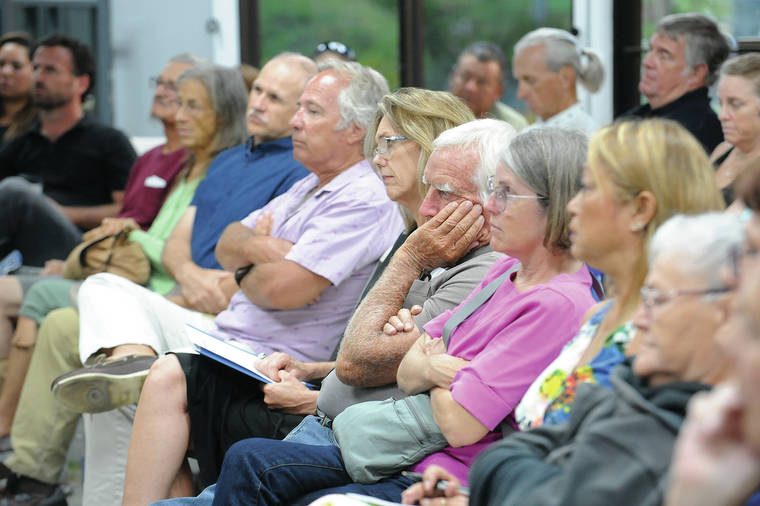
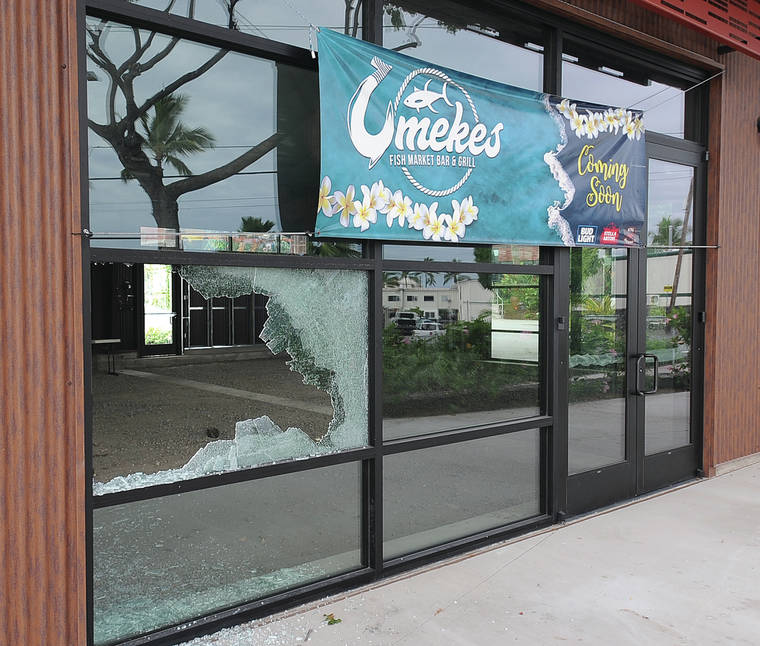
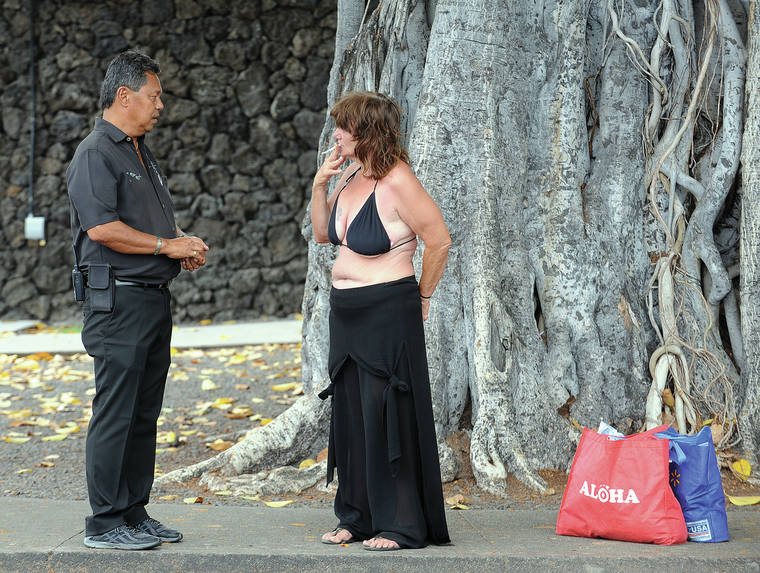
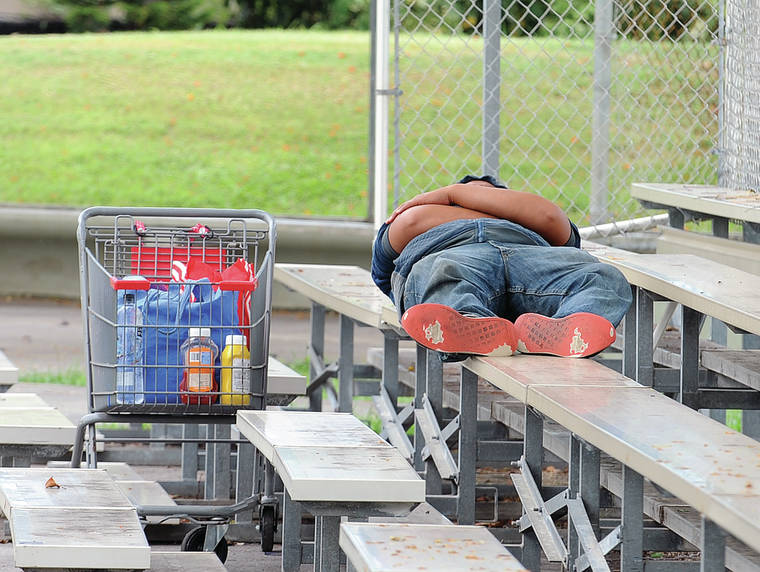
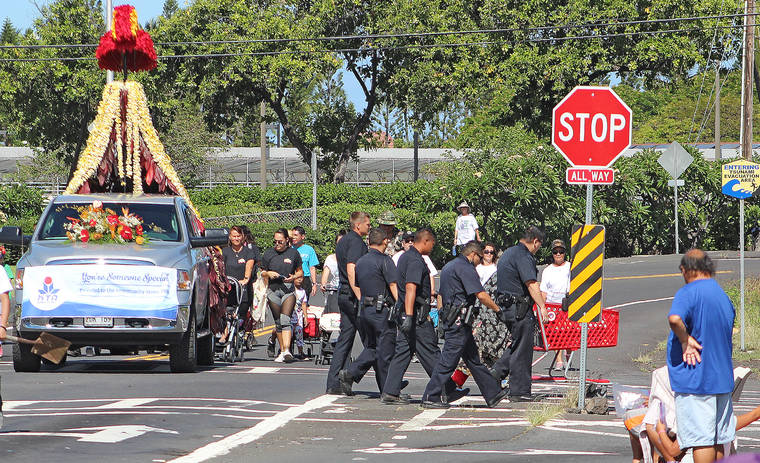

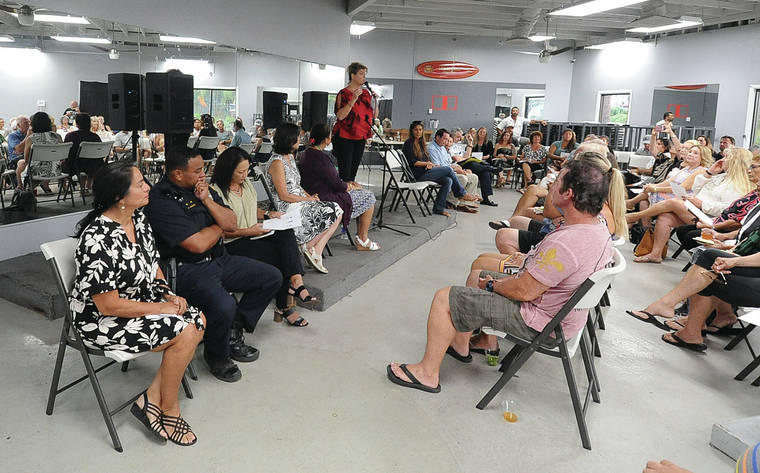
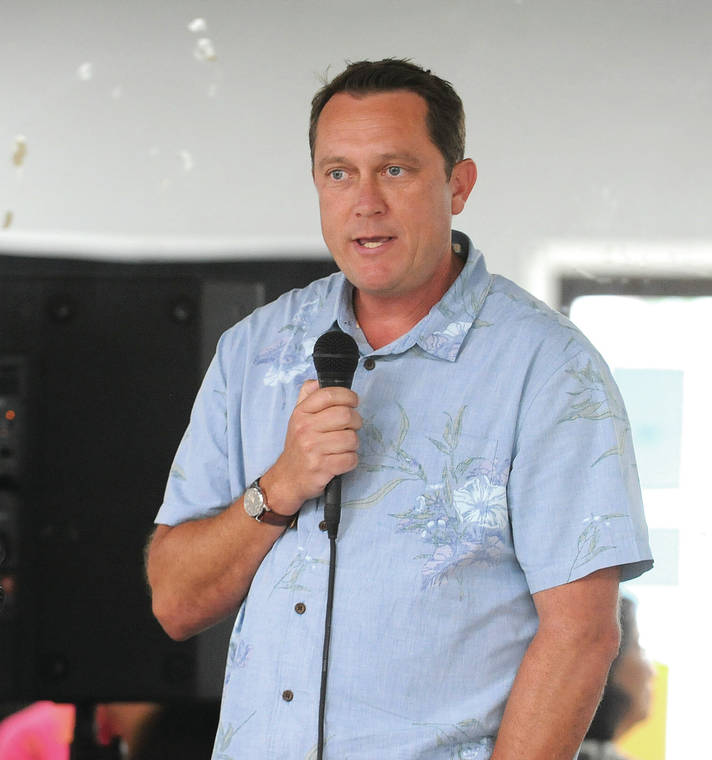



KAILUA-KONA A grassroots effort to put a spotlight on crime and chronic homelessness in Kailua Village is continuing to pick up steam, with a meeting on Monday drawing a crowd of an estimated 130-150 people to the Paina Room at Umekes Fish Market Bar and Grill.
KAILUA-KONA — A grassroots effort to put a spotlight on crime and chronic homelessness in Kailua Village is continuing to pick up steam, with a meeting on Monday drawing a crowd of an estimated 130-150 people to the Paina Room at Umekes Fish Market Bar and Grill.
It was the second such gathering organized to give residents and business owners a chance to share their experiences and bring in those working to address the issue.
“People are concerned. People want to know,” Kona Councilwoman Rebecca Villegas told the crowd at the top of the meeting.“We want to know what’s being done, who’s doing it, how it’s being done, how we can participate, and the levels of interest and enthusiasm and excitement and empowerment that were generated at that first meeting I think are evident because all of you are here this evening.”
While the first meeting, held in May, was a more informal talk story among community members, Monday’s gathering brought together community members with representatives of local government agencies, nonprofits and other community groups all of whom brought their experiences and know-how to the table.
That included people like Regina Weller of the 808 Homeless Task Force, who shared her 25 years of experience getting homeless people off the streets — results, she said, that came out of a meeting in Los Angeles just like what community members here organized on Monday.
One thing she said she learned early on in her work was the importance of looking at the whole community and listening to its residents and police officers and considering all of the community’s needs.
She also emphasized a sense of compassion for everyone on all sides of the issue who is working on or affected by the issue of homelessness, from the public officials to the advocates to the kids playing in parks to law enforcement officers to those experiencing homelessness themselves.
“This business of homelessness is a business of the heart, and it cannot be one-sided,” Weller said. “We have to care about everybody and their livelihood and their safety and how they want to function and what is the pursuit of happiness. It’s different for everybody.”
The meeting kicked off with updates on local initiatives aimed at assisting people experiencing homelessness, such as Kukuiola, the project formerly called Village 9, but much of the focus turned to proposals for what the community needs: more responsiveness from police, more laws to deter things like loitering and public intoxication and more resources to support those with mental health needs or substance use disorders.
One business owner said it’s taken 45 minutes for police to respond to a call, by which time everyone involved has left the scene, and that business owners are afraid to speak out for fear of backlash, adding that some callers have even been threatened with arrest themselves for harassing law enforcement.
In addition to alcohol and drug use the business owner’s witnessed on the seawall along Alii Drive, there are also dire public health issues that go unaddressed.
But police in attendance said getting people off the street by arresting them isn’t as straightforward as some might expect.
“Homelessness is not a crime,” said Community Policing Officer Reuben Pukahi. “We can’t just arrest people for being homeless.”
Pukahi said an arrest requires probable cause and evidence, but added that police are taking steps to be more proactive via outreach and beat sweeps.
The county also doesn’t have specific crimes called public intoxication or loitering, a point that, when raised by First Deputy Prosecutor Dale Ross, sparked disbelief from the crowd.
“Where are we?” asked an audience member.
Under Hawaii County Code, the only references to loitering as a crime are during emergencies such as tsunami warnings or loitering “close to an impending disaster or a disaster area.”
But while some residents proposed changing the laws on those matters, they also insisted that there’s still more police could do, starting with being more present in the area.
“Community policing is being in the community,” one woman said. “And the reason why you don’t see anything is because you’re not there.”
But another part of the conversation was an acknowledgment that the island is lacking when it comes to services and resources on the island.
“It’s not so much the homeless but it is the homeless that are actively using and the crystal methamphetamine problem that we have in our community that is making these people do all these inappropriate things and behave the way that they are,” said Julie Agno, Big Island county services director at Mental Health Kokua, saying the lack of treatment options here is a huge issue for the state.
Currently, she said, there’s a six-month waitlist for in-patient treatment for the whole state, and she urged those at the meeting to press lawmakers to address the issues of substance misuse.
That lack of places for people to go was a point reiterated by attendee Dan Mistak, who also emphasized that services aren’t only critical for the island’s homeless population but also its housed population.
“So this is not just a crisis of getting people off of your doorstep, it’s where are they going to go? Where are they going to call their home?” he said. “They are our neighbors. They are the people that we should be having relationships with. And just figuring out how can we get the police to be able to drag them over to the other side of the island, it’s not going to solve the problem.”
Even after the conversation wrapped up after two hours of discussion, everyone still agreed the work wasn’t going to be put on pause.
Nakoa Pabre, owner of Umekes, said something he would like to see and believes can get done is an increase in police presence, such as foot or bike patrols, saying that businesses shouldn’t have to pay more out of their pockets to hire private security at their businesses.
He also said his issue is specific to those people who are committing crimes, saying it’s those who “don’t want help” who are causing the problems.
“I think the ball is in the county’s hands to step up and show something being done and then showing us that we’re being heard,” Pabre said.
Pabre spearheaded the grassroots movement last month. About an hour before the 6 p.m. Monday meeting began, a person threw a rock through plate-glass windows at the Umekes currently under construction on Pawai Place, according to Stefanie Gubser, operations manager at Manini Holdings, which oversees the 6-acre area.
The individual was served a trespass notice shortly before the incident. Witnesses tried to detain him before police arrived, but he fled on foot.
Villegas said it’s “become very apparent” that there are opportunities for legislation on matters like loitering and public intoxication.
The meetings are expected to continue, and the councilwoman said she wants an upcoming meeting to include more people and groups working in health fields, acknowledging that the lack of mental health services and substance use treatment facilities “is a key component.”
She also said she wants the chief of police and captains to be involved in future meetings. And for residents who are looking for solutions, she said, it’s important they keep coming to be heard.
“Keep coming,” she said. “Be a part of the process.”
WHT photographer/reporter Laura Ruminski contributed to this report.


